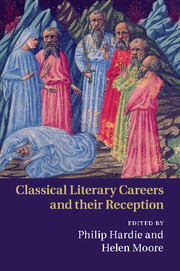Book contents
- Frontmatter
- Contents
- List of contributors
- Preface
- Note on the text
- Introduction: Literary careers – Classical models and their receptions
- 1 Some Virgilian unities
- 2 There and back again: Horace's poetic career
- 3 The Ovidian career model: Ovid, Gallus, Apuleius, Boccaccio
- 4 An elegist's career: from Cynthia to Cornelia
- 5 Persona and satiric career in Juvenal
- 6 The indistinct literary careers of Cicero and Pliny the Younger
- 7 Re-inventing Virgil's Wheel: the poet and his work from Dante to Petrarch
- 8 Did Shakespeare have a literary career?
- 9 New spins on old rotas: Virgil, Ovid, Milton
- 10 Bookburning and the poetic deathbed: the legacy of Virgil
- 11 Literary afterlives: metempsychosis from Ennius to Jorge Luis Borges
- 12 ‘Mirrored doubles’: Andrew Marvell, the remaking of poetry and the poet's career
- 13 Dryden and the complete career
- 14 Goethe's elegiac sabbatical
- 15 Wordsworth's career prospects: ‘peculiar language’ and public epigraphs
- Epilogue: Inventing a life – a personal view of literary careers
- List of works cited
- Index
4 - An elegist's career: from Cynthia to Cornelia
Published online by Cambridge University Press: 10 November 2010
- Frontmatter
- Contents
- List of contributors
- Preface
- Note on the text
- Introduction: Literary careers – Classical models and their receptions
- 1 Some Virgilian unities
- 2 There and back again: Horace's poetic career
- 3 The Ovidian career model: Ovid, Gallus, Apuleius, Boccaccio
- 4 An elegist's career: from Cynthia to Cornelia
- 5 Persona and satiric career in Juvenal
- 6 The indistinct literary careers of Cicero and Pliny the Younger
- 7 Re-inventing Virgil's Wheel: the poet and his work from Dante to Petrarch
- 8 Did Shakespeare have a literary career?
- 9 New spins on old rotas: Virgil, Ovid, Milton
- 10 Bookburning and the poetic deathbed: the legacy of Virgil
- 11 Literary afterlives: metempsychosis from Ennius to Jorge Luis Borges
- 12 ‘Mirrored doubles’: Andrew Marvell, the remaking of poetry and the poet's career
- 13 Dryden and the complete career
- 14 Goethe's elegiac sabbatical
- 15 Wordsworth's career prospects: ‘peculiar language’ and public epigraphs
- Epilogue: Inventing a life – a personal view of literary careers
- List of works cited
- Index
Summary
Virgil created the ideal poetic career, an upwards progression within the range of hexameter poetry, pastoral to didactic to epic. He marked this movement in ways obvious and less obvious: he gets up from the shepherd's sitting position at the close of the Eclogues; at the end of the second Georgic he regrets both the loss of pastoral innocence and his inability to write Lucretian natural philosophy; at the start of the third Georgic he looks ahead to an Augustan epic of sacred importance; in each work he presents an emblematic vision of the nymph Arethusa. Subsequently Ovid produces his own more ambitious versions of the ideal career, going from love elegy to tragedy to the universal epic of the Metamorphoses, and within elegy itself advancing from personal love elegy through the didactic of the Ars to the sacred and aetiological narratives of the Fasti. Each cycle then returns to the personal elegy of lamentation in the Tristia; but even in exile Ovid expands his range with the curse poem Ibis, and more letters.
What of Propertius, Ovid's predecessor as love elegist? Does he show a similar reaction to the Virgilian pattern? Ovid's poetry repeatedly builds on Propertian models, and there is a temptation to see the elegiac books as describing a similar arc to that from the Amores to the Ars and the Fasti, with the personal material of Books 1 and 2 opening out to more general material, discursive and moral in 3, aetiological in 4.
- Type
- Chapter
- Information
- Classical Literary Careers and their Reception , pp. 89 - 104Publisher: Cambridge University PressPrint publication year: 2010
- 5
- Cited by



